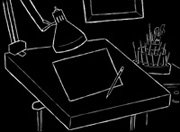
Silent film star Mary Pickford famously described director Ernst Lubitsch as a “director of doors,” a man more at home working with the choreography of entrances and exits than with actors and emotions. This acerbic remark, uttered in the awake of an ill-fated collaboration with the director on Rosita, his first American production, has a grain of truth but should be taken with a grain of salt as well.
Pickford was one of the most powerful figures in Hollywood and not inclined to accept a secondary role in a film’s creation. But Lubitsch’s films were not so much vehicles for stars so much as they were vehicles for Lubitsch, for his subtle and distinctive wit, both with images and later with dialogue.
A viewing of Lady Windermere’s Fan (1925) shows the truth behind both sides of the argument. The film shows tonight at Pacific Film Archive as part of a month-long career-spanning retrospective of the director’s work entitled “The Lubitsch Touch.” The series runs through Feb. 16 and tracks the legendary director’s career from his early German silent films to his much-celebrated American comedies of the sound era.
Lady Windermere’s Fan is an adaptation of an Oscar Wilde play that brazenly tosses out the words of Wilde in favor of sly visual humor and cues, replacing Wilde’s verbal wit with Lubitsch’s visual wit. The actors do good work, but clearly the director is in control, for the performances are not inspired but are instead matched meticulously to the staging and camerawork. There’s very little dialogue; most of the information is imparted to us simply through facial expressions, mannerisms and editing.
Many stars appeared in Lubitsch’s films, but Lubitsch himself was the true star of his productions, a noted auteur who guided the performances of his actors down to the smallest detail. Like Chaplin, he acted out each role and instructed his actors to mimic him, and, as with Chaplin again, this at times led to rather stilted performances. The actors were not permitted much leeway in plying their trade. However, the fact that the technique so often found such great results was a testament to Lubitsch’s unique talents.
One scene in particular illustrates Pickford’s dissent perfectly: Lubistch, in order to quickly and comically expresses the increasing intimacy between a couple, gives us two scenes of the suitor approaching the front door of his lady’s apartment. A close-up shows just his hand as he starts to ring the doorbell, things twice, hesitates, pulls out a pocket mirror, replaces it, then rings the bell and politely offers his coat and hat to the maid while waiting to be introduced. A second scene, taking place some weeks later, shows the hand again ringing the bell, this time with no hesitation. The man then walks brusquely through the door and past the maid, hanging his hat and coat without her help before bursting into the lady’s rooms unannounced. All necessary information is conveyed through intertitles, camerawork and editing. The acting is almost superfluous; it’s Lubitsch’s performance through and through.
His technique is not exactly subtle; in fact, Lubitsch’s presence can almost always be felt in his films, and this is a mixed blessing. Just as it is difficult to read Wilde without marveling at his wit, one cannot view a Lubitsch film without being made acutely conscious of the wit and style of the director. At its best it is a seductive technique, one that draws the viewer into an alliance with the director, making one feel as if one is in on the joke, sharing in the sense of superiority toward the objects of that wit; but at times it has a tendency to drain a film of drama and impact, maintaining a cynical distance from characters who are reduced to mere pawns in the director’s cinematic game.
The result is that Lubitsch’s films, though often just as entertaining today as they were in their time, are less art than entertainment, fun for their two-hour span but with little impact beyond the moment the theater lights come up. The “Lubitsch touch,” though deft, is a light touch, one that only lingers playfully amid the more complex, underlying themes of the story, rarely delving deeply into character, motivation or import. He won’t change your life but for two hours he’ll take you for a fun and stylish ride.
Other films in the series include Ninotchka, The Shop Around the Corner, Angel, Heaven Can Wait, Trouble in Paradise, The Marriage Circle, Rosita, The Love Parade and The Smiling Lieutenant. The series runs through Feb. 16. $4-8. 2575 Bancrot Way. 642-5249. www.bampfa.berkeley.edu.






